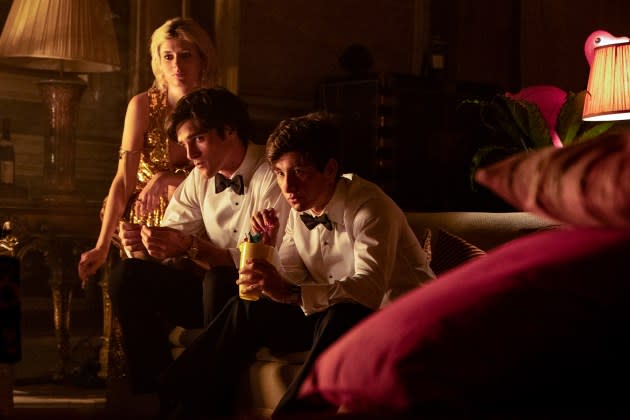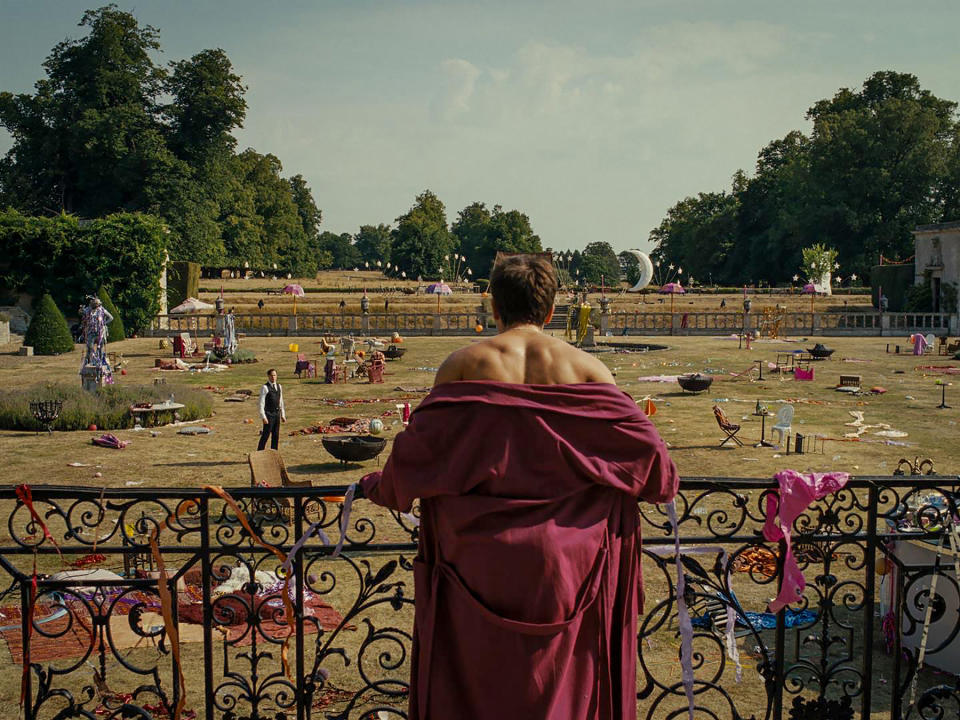‘Saltburn’: Sex, Lies, and a Very Naked Barry Keoghan
- Oops!Something went wrong.Please try again later.
- Oops!Something went wrong.Please try again later.
- Oops!Something went wrong.Please try again later.
- Oops!Something went wrong.Please try again later.
- Oops!Something went wrong.Please try again later.

In America, we still like to pretend we don’t operate within an Old World-style class system. (Should you continue to labor under that delusion in the year of our lord 2023, we suggest you try taking a commercial airline flight some time.) Anyone can rise above their station, one bootstrap-tug at a time! England, however, has never tried to hide the fact that there was, is, and always has been a separation of haves and have-nots governed by toxic traditionalism, strict social strata, and fetishized notions of aristocracy.
I suppose there’s a version of Saltburn, writer-director Emerald Fennell’s follow-up to her candy-colored 2020 revenge flick Promising Young Woman, that could have been set in the tonier drawing rooms and Ivy League enclaves of the U.S. of A., in which a wolf in beta-male clothing insinuates himself into the herds of Kennedys and Rockefellers. But her declaration of class warfare really needs to be set in the land of Oxford bacchanals, ginormous country estates, and superiorly clipped consonants. The envy and endless wanting is universal. But the vocabulary that Fennell’s using for this slurred cri de coeur feels extremely regional — an empire in which the sun never sets, provided you have the right jackets, ties, and fangs.
More from Rolling Stone
'Saltburn' Is Now Streaming: Here's How to Watch the Film Online for Free
Sydney Sweeney: 'Euphoria' Cast Was 'Constantly on the Phone Crying' After Angus Cloud's Death
Adam Sandler Confronts His Intergalactic Angst in New 'Spaceman' Trailer
Our “hero” is named Oliver Quick — Oliver Twist was already taken — and, in what feels like a quiet casting coup, is played by Barry Keoghan. He’s one of those bright young actors from across the pond who feels like he’s been around forever, blessed with a 1950s matinee idol’s eyes and a 1930s character actor’s mug. You might remember him as the dim-witted soul who quietly utters, “Well, there goes that dream” after a romantic rejection in last year’s The Banshees of Inisherin and earned himself an Oscar nod. (The psychotic kid in The Killing of a Sacred Deer and the Joker-esque mystery prisoner in The Batman? That’s Keoghan, too.) And regardless what you think of Fennell’s addition to the eat-the-rich satire canon, it’s obvious that it transforms the 31-year-old actor into an above-the-title star before its climactic scene. Possibly because of its climactic scene, in fact, but let’s not get ahead of ourselves.
Oliver has just started his first year at Oxford, and is painfully out of his element. He’s whip-smart, well-read, and socially lost at sea. So of course the Big Man on Campus, Felix Catton (Jacob Elordi, a.k.a. Elvis in Priscilla and Hot Toxic Dude No. 3 in Euphoria), instantly beguiles him! He’s rich, Greek-statue handsome, privileged, and seems to get whatever he wants. One day, Felix’s bike has a flat. Oliver lends him his bike. That night at the pub, Catton calls him over to thank him and introduce the shy young man to his friends. Soon, Quick is spending his free time lounging around with this Abercrombie & Fitch ad come to life. “He’ll get bored of you,” another student warns him. Then a family tragedy earns Oliver an invite over a school break to Saltburn, the Catton’s extravagant country home. Felix offers it in a moment of pity and charity. His guest cunningly sees it as an opportunity.
Fennell herself attended Oxford around the same time the movie takes place, 2006 — yet there’s no sense that she’s settling personal scores, nor that she’s putting her talent for poking wounds and prodding the seemingly untouchable in these early university scenes. That comes later. Once Oliver meets up with Felix at this pastoral Xanadu, he quickly sizes up his fellow occupants: Felix’s mom, Lady Elspeth (Rosamund Pike), is slightly hippie-ish, totally passive-aggressive, and can cut through bone in a single tossed-off comment. His dad, Sir James (Richard E. Grant), gives the appearance of having stepped out of the pages of a P.G. Wodehouse novel but’s too befuddled to find his way back. Felix’s sister, Venetia (Alison Oliver), acts a cream-drunk cat toying with the mouse of the moment: “I like you even more than last year’s one,” she coos. There’s also a butler (Paul Rhys) with a subzero-temp stare, who seems suspicious of this stranger from the jump.
As for the other seasonal guests — a fellow student named Farleigh (Archie Madekwe) who’s an old family friend, and Elspeth’s Goth-kook pal Pamela (Carey Mulligan, quietly pocketing all of her scenes) — Oliver watches how the family can be overly polite to them one second, and immediately condescending and casually cruel to them the next. Our man may not know how breakfast works in this household, but he’s remarkably observant when it comes to coded human behavior. And when Oliver’s not wasting afternoons by the lake or playing tennis in a tux to MGMT’s “Time to Pretend” [ahem], he’s taking a lot of notes. All the better to blend in….

It’s all fun and games until someone licks up the bathwater that their crush has just ejaculated in, and once that oh-wow transgression drops around the halfway mark, you feel Saltburn setting sail into edgier, dodgier territory. Yes, we’re going there, the movie announces, and what follows is a variation on the slow, steady takeover scenario that’s worked wonders for Tom Ripley, Terence Stamp in Teorema, and dozens of other onscreen strivers systematically fucking their way to the top of the socioeconomic heap. Characters who you think Oliver will seduce and destroy do indeed get seduced and destroyed; a graveside vigil goes on long enough to take exactly the predictably startling turn you think it will, yet hope it won’t. Characters who start out as caricatures are given just enough humanity to lose it or have it trampled out of them. Bad behavior comes in many shapes, sizes, and via soirées destined to bring out the beasts in people.
And it’s in this last half that you can feel both halves of the film’s creator fighting it out for control of this Downton Abbey episode turned inside out. Fennell clearly has a sharp sense of how satire works, and while class warfare does not bring out the righteousness and rage of the #MeToo movement that fueled Promising Young Woman, it feels like a meatier subject for her slice into with swifter, more wounding parries. Yet she also feels a need to be provocative in a way that sometimes seems to merely be provocative for its own sake, indulging in the same nagging sensationalism that also dogged her debut. Every time you can feel Fennell and her cast start to find a comic — or comically horrific — rhythm for these ugly denizens of the upper crust, some sort of choreographed controversial moment or borderline-prefab bit of perversity threatens to simply jolt you into a reaction. There are too many examples of a chainsaw being inexplicably subbed in for a scalpel to make this effectively work as either dark comedy or darker commentary.
Which makes you that much more thankful for the person holding this all together and shoving it all forward through sheer charisma, fearlessness, and fuck-it-all fortitude. That’s Barry Keoghan, and at the risk of offending his co-stars — notably Grant, who appears to wink at his Withnail & I past in parts, and Mulligan, who deserves her own spinoff sequel — he’s the sun around which these other planets rotate. He’s the one who sells some of the script’s more hairpin turns, who drops breadcrumbs regarding the character’s moral compromises (assuming that moral compass was set to true north in the first place), and makes you feel as if the more outré Freudian shocks are laced with at least a little awe. That previous movie-star-turn mention isn’t an exaggeration.
And that is before one last bit of business, in which Barry turns a butt-naked victory dance to Sophie Ellis-Bextor’s “Murder on the Dance Floor” into something genuinely showstopping. Come for the class warfare and the occasional shots-fired zingers about the rich being different than you and me. Stay for Keoghan twirling in circles, with nothing but shafts of late afternoon light and the entirety of what God gave him expressing the bliss of going from pretender to predator.
Best of Rolling Stone

